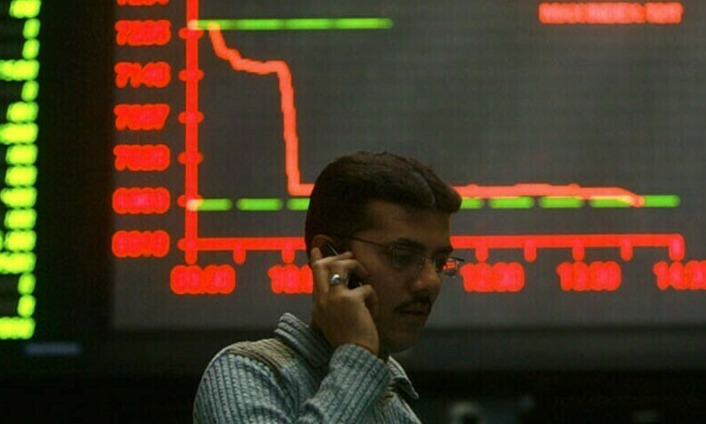Share prices on the Pakistan Stock Exchange (PSX) continued to be affected by a correction anticipated by most analysts, as the KSE-100 falls nearly 4% as a significant correction persists.
The benchmark index was valued at 62,833.03 at the close, representing a decline of 2,371.64 points, or 3.64%. The index had previously fallen to an intra-day low of 62,360.78.
Index-heavy sectors such as automotive assemblers, cement, chemicals, commercial banks, oil and gas exploration companies, OMCs, pharmaceuticals, and refineries all experienced substantial declines in value, reflecting widespread selling.
Read more: PM Travels To Kuwait To Extend Condolences On Amir Sheikh Nawaf’s Passing.
Additionally, investors engaged in profit-taking on Monday, as evidenced by the benchmark KSE-100 Index falling more than 900 points to close near the 65,000 level.
The current profit-taking trend follows a bullish surge on the bourse, during which the index surpassed 66,000.
The correction was anticipated, according to experts, and investors are now eagerly awaiting the January 11, 2024 meeting of the Executive Board of the International Monetary Fund (IMF). The first review of Pakistan’s current $3 billion stand-by arrangement (SBA) is scheduled at this meeting.
The current $3 billion IMF program is expected to conclude in the second week of April 2024, with an estimated $1.8 billion in unallocated funds. In July, the Fund disbursed $1.2 billion in its initial tranche.
The KSE-100 Index has experienced an enormous bullish run this year, accumulating nearly 60%.
In the interim, experts observed that a surge in worldwide oil prices further perturbed market sentiment amid escalating instability on the international stage.
As attacks on ships in the Red Sea by Houthi militants, who are aligned with Iran and operate out of Yemen, disrupted maritime commerce and compelled companies to reroute vessels, oil prices increased on Tuesday.
On Monday, oil tanker group Frontline announced that its vessels would avoid passage through the waterway, and oil central BP temporarily halted all transits through the Red Sea. These actions indicate that the crisis has expanded to encompass energy cargoes.
As a net importer of petroleum, Pakistan is adversely affected by the escalation in oil prices, given the country’s preexisting challenges of elevated inflation and soaring energy costs.
The benchmark index was significantly depressed by the banking sector (-243.14 points), oil and gas exploration (-301.54 points), and fertilizer (-228.79 points).
The all-share index experienced a decline in volume from 1.89 billion in the previous session to 1.51 billion.
Nonetheless, from the previous session, the value of shares rose to Rs29.1 billion from Rs24.6 billion.
The volume leader was K-Electric Limited with 341.06 million shares, followed by Cnergyico PK with 131.72 million shares and WorldCall Telecom with 176.03 million.
On Tuesday, the shares of 386 corporations were exchanged; of these, 31 experienced an increase, 351 a decline, and four remained unchanged.

